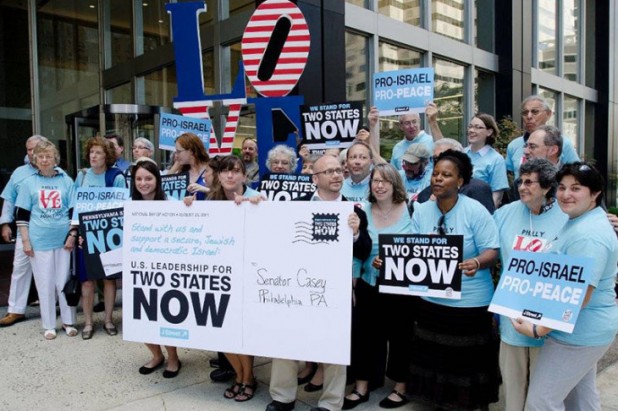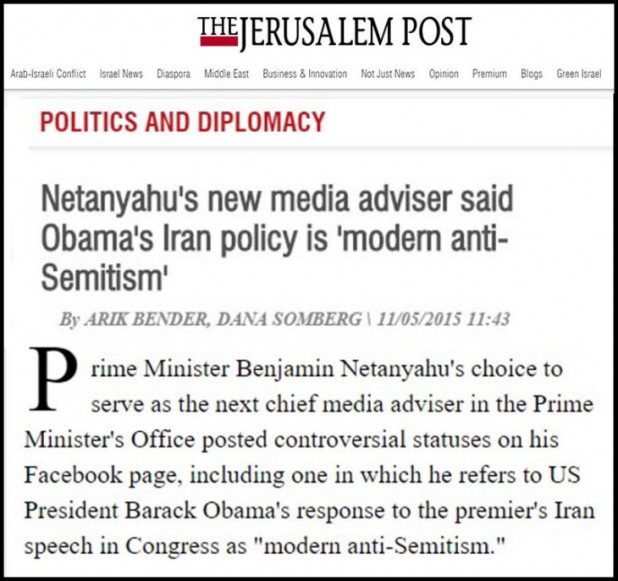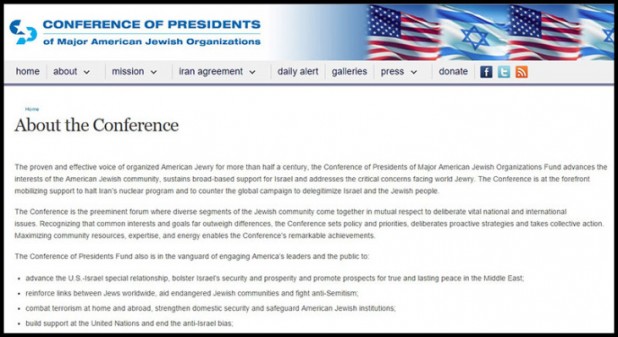The New Observer
November 7, 2015
The renewed uproar over accusations made by a senior Israeli government official that Barack Obama is “anti-Semitic” reflects a split among Jews on how Israel should best be presented to the outside world, and not any divergence on the fundamentals of Jewish Supremacism in Israel or America.

The Israeli media have recently been running stories about Facebook comments made by Ran Baratz, the newly-appointed chief communications director for the Israeli Prime Minister’s office. The Jerusalem Post, for example, quoted a Baratz Facebook comment on Obama’s support for the “Iran nuclear deal” in this way:
This is what modern anti-Semitism in a liberal Western country looks like. And, of course, it comes with a great deal of tolerance and understanding for Islamic anti-Semitism. The tolerance and understanding is so great that [Obama] is willing to give it a nuclear bomb.
The Jerusalem Post also dredged up Baratz’s 2012 Facebook comment, made after Obama’s re-election, in which he said that:
For the next four years, a pro-Arab, anti-Israel president will continue to rule. The Jews have once again voted for Obama by a wide majority, and this just shows how wide the gap has become between the Jews of Israel and the Jews of the US.
It has now been suggested that Baratz might not be confirmed in his post after all, given the offense that these comments are likely to cause in Washington. However, more importantly than that, Baratz’s comments do indeed accurately reflect a divergence in opinion among Jews in Israel and in America.
In Israel, there is little doubt that his remarks reflect popular Jewish public opinion (see the Jewish Telegraphic Agency’s, “Obama’s latest wooing of Jews not working, poll suggests,” June 11, 2015).
In America, the strongest support for this position comes not from the Jewish community, but, bizarrely, from American Christian “right wingers” such as Donald Trump and the Republican Party (see MNSBC’s report, “Trump, Cruz and Palin unite to slam Iran nuclear deal,” 09/09/15).
American Jews, however (as Baratz correctly said), still for the largest part, align themselves with the “left wing” of the US political spectrum, and vote overwhelmingly for the Democratic Party.
However, “left wing” Jews in America all still support Israel, certainly as much as any “right wing” Jews.
The best evidence of this comes from something called the Conference of Presidents of Major American Jewish Organizations. This organization represents every major religious and non-religious Jewish lobby in America, and, on its website, describes its mission as to “work publicly and behind the scenes addressing vital concerns with US and world leaders, key opinion molders and the public about Israel’s security and vitality.”
Among its 51 member organizations are the American Jewish Congress, the Anti-Defamation League, the American Sephardi Federation, American Zionist Movement, B’nai B’rith, the Central Conference of American Rabbis, the Women’s Zionist Organization of America, the Jewish Community Centers Association, the Jewish Federations of North America, the Jewish Labor Committee, the Rabbinical Council of America, the Union for Reform Judaism, and the Union of Orthodox Jewish Congregations of America.
There is therefore no question that Jews in America, “left” or “right,” all support Israel. This central major Jewish organization, which represents American Jewry, proves this beyond any doubt.
Why then, is there even a “split” among Jews, both in the US and in Israel?
The answer is simple: “Left wing” Jews differ only from “right wing Jews” on the way to best preserve the state of Israel, and how to reduce criticism from non-Jews, not on anything else.
A superb illustration of this truth was contained in an article published by the Jewish Forward newspaper (“How Israel’s Wars Hurt Diaspora Jews,” July 27, 2015), which reported on an Israeli cabinet meeting held on June 28 of that year devoted to “the annual briefing on the current state of Jewish life worldwide.”
The Israeli cabinet discussed a special report which revealed that Jews outside of Israel, and particularly in America, are finding it increasingly difficult to explain Israel’s behavior to non-Jews. As the Forward explained:
It [the report] describes dramatic changes detected in the past year, mostly for the worse, in Diaspora Jewish attitudes toward Israel, its government policies and its military actions.
In part the changes reflect shock at Israel’s behavior, both in the domestic arena and in warfare. In part they’re due to discomfort and inability to explain Israel’s actions when asked by non-Jewish friends and family.

In Israeli terms, this correlates to the political division between Jews who support the “right wing” Likud party, and those who support the “left wing” Labor Party in that country.
The Labor Party was, from the foundation of Israel until 1977, that country’s dominant political party. Every Israeli Prime Minister up to that year was either a member of that party or of its immediate predecessor.
However, after 1977, the Israeli electorate swung to the “right,” and elected the first of many successive Likud-led coalition governments.
This “swing to the right” has been empowered by the ever-increasing numbers of fanatic Orthodox Jews in Israel, who have their own parties. These orthodox religious parties are now of such electoral significance that they are able to provide the Likud government with majorities in the Israeli parliament. In this way, they can, and often do, implement policies regarded as “right wing” Zionism—such as support for the illegal settlement program by Jews in the occupied West Bank.
For its part, the Likud party is adamantly opposed to any sort of “agreement” with the Palestinians which might involve the creation of a Palestinian state, so their policies dovetail perfectly with those of the religious parties.
On the other hand, the Labor Party supports what it calls “the Israeli–Palestinian peace process,” started by its assassinated former leader Yitzhak Rabin—who was killed by a supporter of one of the religious parties in coalition with Likud.
In the latest Israeli election (March 2015), the Labor Party and its allies together polled 18.67 percent of vote, giving them 24 seats in the Knesset (19 of which were directly elected as Labor Party members).
Likud and its religious party allies (the “Jewish Home,” “United Torah Judaism,” “Kulanu,” and “Shas,”) together polled 49.36 percent of the vote, giving them 61 seats (30 of which were directly elected as Likud party members).
From this overview it can be seen that the real division among American Jewry is between those who support the Israeli Labor Party’s version of Zionism, and those who support the Likud party’s version.

There is no moral compunction about what is ethically “right or wrong” at work here. The only motivation is what is in international Jewry’s best interests: to adopt either a hardline “all-out-suppression-of-the-Palestinians-no-matter-what-the-world-says” policy, or to present the Zionist state in a more public relations savvy “friendly” light.
There is no intention on the part of “left” or “right” wing Jews to change any of the underlying issues which have created so much conflict: namely the Jewish lobby’s effective control of the political process in the US, and the fact that the state of Israel was founded on land violently and bloodily stolen from the Palestinians.
 Daily Stormer The Most Censored Publication in History
Daily Stormer The Most Censored Publication in History





